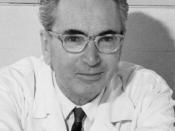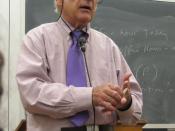Consciousness, Free Will, and Purpose in Human Life
In the book Minds, Brains, and Science, author John Searle discusses the ability of humans to provide their own consciousness and free will. He poses the question, "Why exactly is there no room for the freedom of the will on the contemporary scientific view?" (93). In short, his argument is that contemporary science (such as physics) looks at problems from the bottom up. The smallest parts and processes come together to form the larger parts and processes, and it is because of the nature of the smaller parts that we have the larger processes that we can discern, and all of this functions according to laws that govern how these parts and processes interact and cause each other (93). This remains a very neat package until one attempts to consider the idea of free will using the same types of laws and formulas that apply to the contemporary physical sciences.
If we consider that our thoughts cause our bodies to move, then we are looking at this particular problem in a manner that is actually inconsistent with the way we explain processes in the physical sciences. If we consider that it was the electrochemical activity in our brains that stimulated both our thoughts concerning movement and the movement itself, this still does not account for our perception that as humans, we can choose to move, or not to move (94). Based on this information, it is not difficult for me to side with Mr. Searle, or even to imagine that any real laws that govern such mental features as consciousness and free will would operate and be stated in ways that do not always run parallel to our accepted contemporary physical laws.
Searle also poses the question, "What is it about our...


